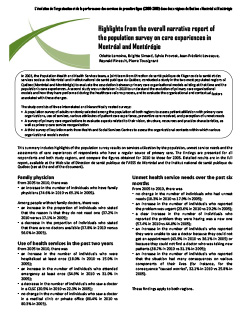Highlights from the overall narrative report of the population survey on care experiences in Montréal and Montérégie
In 2005, the Population Health and Health Services team, a joint team from Direction de santé publique de l'Agence de la santé et des services sociaux de Montréal and Institut national de santé publique du Québec, conducted a study in the two most populated regions of Québec (Montréal and Montérégie) to evaluate the association between primary care organizational models existing at that time and the population's care experiences. A second study was undertaken in 2010 to understand the evolution of primary care organizational models and how they have performed during the healthcare reform process, and to evaluate the organizational and contextual factors associated with these changes.
The study consists of three interrelated and hierarchically nested surveys:
- A population survey of adults randomly selected among the population of both regions to assess patient affiliation with primary care organizations, use of services, various attributes of patient care experience, preventive care received, and perception of unmet needs
- A survey of primary care organizations to evaluate aspects related to their vision, structure, resources and practice characteristics, as well as primary care service reorganization
- A third survey of key informants from Health and Social Services Centres to assess the organizational contexts within which various organizational models evolve
This summary includes highlights of the population survey results on services utilization by the population, unmet service needs and the assessments of care experiences of respondents who have a regular source of primary care. The findings are presented for all respondents and both study regions, and compare the figures obtained for 2010 to those for 2005. Detailed results are in the full report.


